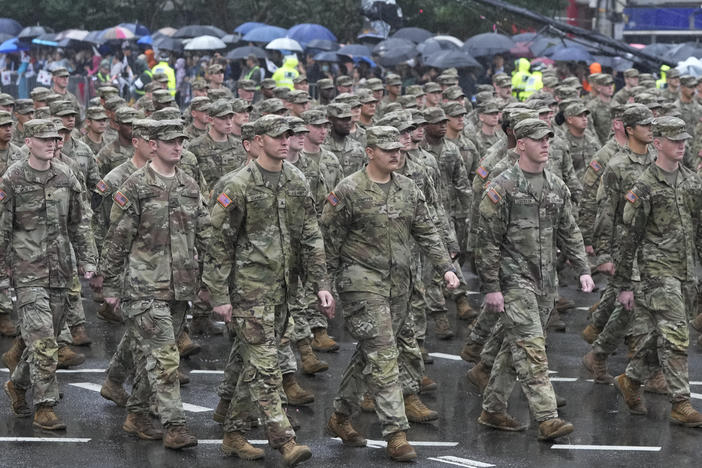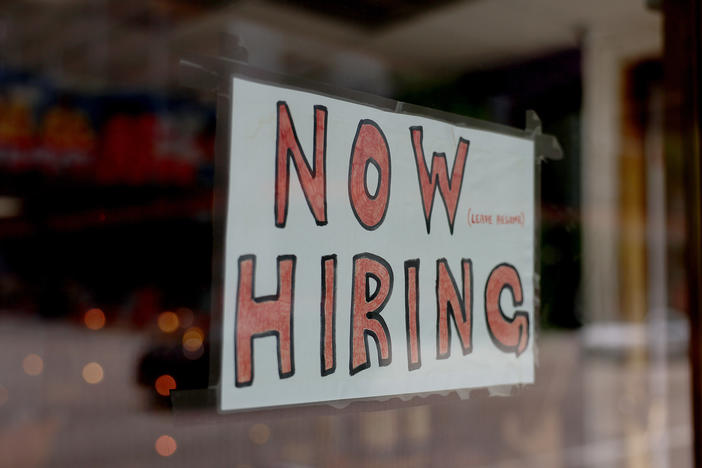Section Branding
Header Content
There's a backlog at U.S. ports. Here's how Biden hopes to get you your goods, faster
Primary Content
President Biden addressed ongoing supply chain problems, as major retailers warn of shortages and price hikes during the upcoming holiday season.
Transcript
RACHEL MARTIN, HOST:
President Biden is going to talk about all these shortages today. He's expected to announce agreements that the White House has negotiated with the private sector to get goods flowing again.
White House correspondent Franco Ordoñez is following that and joins us. Hey, Franco.
FRANCO ORDOÑEZ, BYLINE: Hey, Rachel.
MARTIN: What can the White House do about these supply chain issues? I mean, there doesn't seem to be a quick fix here.
ORDOÑEZ: Right. I mean, these supply chain problems are something the White House has been working on for a while. There have been earlier efforts on semiconductors and pharmaceuticals. But Biden's plan this time around is to fix some of the bottleneck at the ports on the West Coast...
MARTIN: OK.
ORDOÑEZ: ...And put more pressure on the business community to move faster. As one senior official told us reporters on a call last night, is that these supply chains are essentially in the hands of the private sector. So they need the private sector to step up.
MARTIN: OK. So let's talk about these deals the White House has apparently come up with. Tell us about them.
ORDOÑEZ: Well, what they're going to announce is an agreement with the Port of Los Angeles, which has agreed to essentially double its hours and go to 24/7 operations. The port is joining the Port of Long Beach, which launched a similar hour plan a few weeks ago. Together, the two ports in California handle 40% of the container traffic that enter the United States.
MARTIN: Wow.
ORDOÑEZ: The White House says they've also secured commitments from three of the largest good carriers - Walmart, FedEx and UPS - to take steps to move toward 24/7 operations as well. You know, the goal, as I mentioned, is to get things moving. The White House says the union is on board to work these longer hours, and the retailers are too.
MARTIN: So, I mean, is this expected to make an immediate impact?
ORDOÑEZ: Well, they certainly feel it will. But you still have to move all that cargo through the middle of the country, which means a lot more throughput by truck and rail. I mean, most of all, goods spend some time on a truck. And there is already a severe truck driver shortage. That predates the pandemic. And it's only gotten worse. The White House says they're trying to work on that as well, including increasing commercial drivers' licenses so that the trucking industry can boost its hours. So it is a big step, but there are many to go. Another goal they have is to just send a message to others along the supply chain that if they want to compete, they need to do more also.
MARTIN: So Republicans have tried to lay blame for the higher prices on consumer goods directly at the feet of President Biden. They say that the direct payments to some Americans through his economic recovery plan have driven up the price of consumer goods and discourage people from getting back into the workforce. Is the president likely to address these criticisms head-on today?
ORDOÑEZ: I mean, it is on their minds. The White House did address that in the same call with reporters. On the one hand, they made clear that this is far from just a U.S. problem. It's a global challenge that has been made worse by the delta variant. Just as an example, two of the world's largest ports in China experienced some closures due to COVID-19 outbreaks. And last month, hundreds of factories in Vietnam had to close. The administration does say that part of this has to do with increased domestic demand. But they see that as a positive sign of recovery. And as for the impacts on the labor supply, they acknowledged that's more complicated. They argue the extra money from the aid package served as a lifeline for struggling Americans. And they say if it's now allowing people to be more thoughtful about when and how to return to the labor force, well, they say that's a good thing.
MARTIN: White House correspondent Franco Ordoñez - thank you so much, Franco.
ORDOÑEZ: Thank you. Transcript provided by NPR, Copyright NPR.
Bottom Content



